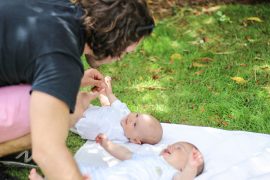So how can you help your child learn self-control and emotion regulation?
It’s possible that some children may be born with an advantage. Brain scans find actual physical differences between adults who were able, at age four, to delay eating the treat, and those who weren’t. The prefrontal cortex was more active in high delayers and the ventral striatum was more active in low delayers when they were trying to control their responses to alluring temptations.
But many researchers believe these brain differences are the result of children “practicing” — using the brain differently — during the first four years of life. The brain is taking shape in response to our use of it at all ages, and especially in the first five years. So the repeated experience of choosing to control an impulse in order to achieve a higher goal would have the effect of strengthening the prefrontal cortex. Practicing self-discipline — but it must be initiated by the child and be for something the child wants, not for something we want — builds the brain muscle to self-regulate. We’ll talk more about this in our next post.
It also turns out that we can help children become more successful at the marshmallow task by teaching them simple techniques to manage their minds. Of course, we don’t yet know how well these learned techniques for this specific task translate into more control in real life. What we know about the brain suggests that a child would need to “practice” those techniques regularly to sustain those skills.
So the question is, regardless of your child’s innate ability, how can you raise a child who can manage her emotions, anxiety and impulses so that she can manage her behavior to accomplish her goals? We dig into the answer to that question in my post, How to Help Your Child Develop Self Control. For today, just notice your own ability to manage your emotions and behavior. (Yes, that’s a clue!)
How can I replicate the marshmallow test at home to see if my preschooler will be successful in life?
You can’t! Seriously, this test was not done with parents, but with a specific lab protocol. And if this is your focus, you’re missing the point. The point is that children CAN develop the ability to self-regulate in early childhood and it will help them achieve their goals in life. The question is HOW to help them develop that ability (which is our next post). If you’re doing those things, then you don’t have to test your child. You know they’re developing the emotional regulation to be successful and happy. So there’s no need to test your child; just ask yourself if you as the parent are doing the things we talk about in the next post.
Wasn’t there follow-up research that showed that the child has to trust that the adult promising the double treat will really deliver?
Yes, indeed. If the researcher made himself seem unreliable (for instance, by promising toys that turned out not to be in the room), the children were much more likely to eat the first treat immediately. That’s a smart response if you don’t trust the adult to keep their promises. And certainly some children have grown up in situations where if you don’t eat now, there might not be food later, so they’ve learned that it’s smarter to go for immediate gratification. But none of this invalidates Mischel’s findings that the children who were able to delay eating the treat — when they wanted to — were also able to be more successful throughout life.
I’ve heard that the marshmallow test is actually just a test of intelligence, not ability to self-manage, which would explain the higher SAT scores and grades.
Well, the kids did have to come up with strategies to avoid eating the marshmallow, and it certainly makes sense that children who had more intellectual resource would be more successful at that. These strategies ranged from stroking the marshmallow lovingly (guess how long it took to reach the child’s mouth?) to covering the marshmallow so it wasn’t visible and focusing on a toy (which, yes, was an effective strategy to resist eating the treat). But the ability to distract themselves with strategies wouldn’t be a simple question of IQ; it might well have more to do with creativity, and the emotional regulation to hold their impulses in check.
Don’t forget that the high-delayers were also more successful with peers, more cooperative with parents and physically healthier as adults, all of which would probably have more to do with emotional regulation than with IQ. So we’re talking about success in many areas of life, not just IQ-related.
Finally, in Mischel’s original sample, the children were all from families who either worked at Stanford or were grad students, so they were all, as Mischel himself said, from a highly intelligent subsection of the population. And yet even within this cohort, there were significant differences in outcome — which would be unlikely to come just from intelligence, since all of these kids would have scored much higher than average on IQ tests.
How come French kids are better at the marshmallow test?
Actually, they aren’t. You may have read about the marshmallow test in the book Bringing Up Bébé, where Pam Druckerman quotes Walter Mischel, the originator of the marshmallow test, as support for her conclusion that Parisians, beginning when they’re children, have more self control than Americans. But Mischel didn’t actually test French children, and the marshmallow test doesn’t actually support Druckerman’s conclusions about how kids develop self control. Druckerman claims that self-control comes from the French practice of training kids to wait for attention and follow rigid schedules, but there’s no evidence of that, and lots of evidence that other factors are what help kids develop self-control. Mischel himself ascribed self-control to “the ability to regulate hot emotions” which has nothing to do with being taught to wait for attention; in fact, quite the opposite — self regulation develops more quickly when parents are more responsive. We talk more about this in the How to Help Your Child Develop Self Control post.
Find the original article here.
By Dr. Laura Markham, founder of AhaParenting.com and author of Peaceful Parent, Happy Kids, Peaceful Parent, Happy Siblings and her latest book, the Peaceful Parent, Happy Kids Workbook.










